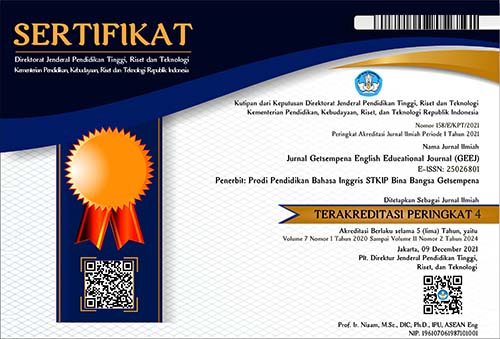THE EFFECTIVENESS OF APPLYING CONSTRUCTIVE CONTROVERSY METHOD IN GAINING STUDENT’S CRITICAL THINKING FOR WRITING ARGUMENTATIVE ESSAY
Abstract
This research examined the effectiveness of applying Constructive Controversy method in terms of gaining student’s critical thinking, thus their argumentative writing become solid. By using quasi-experimental design, this research took 20 students as respondents from both two classes, V-A as experiment class and V-B as control class. The scores of pre-test and post-test gathered from both classes are tested first through pre-requisites analysis; Normality of Kolmogorov-Smirnov and Homogeneity of Fisher. Then, the result of t-test showed that the t-observed was 2.88, and t-table was 2.02 on level of significance 0.05 with degree of freedom (df = n + n – 2) was 38. Regarding to the calculation, to > tt which means Ho hypothesis is rejected meanwhile Hi hypothesis is accepted. Therefore, Constructive Controversy method is effective to help students in gaining their critical thinking known from their arguments when writing argumentative essay.
References
Anker, S. (2010). Real writing with reading: paragraph and essays for college, work, and everyday life. Boston: Bedford/St. Martin’s.
Bickford, J. H. (2011). A comparative analysis of two methods for guiding discussions surrounding controversial and unresolved topics. Eastern Education Journal, 40(1) pp. 33-47.
Brookfield, S. D. (2012). Teaching for critical thinking; tools and technique to help students question their assumption. San Francisco: Jossey-Bass A Wiley Imprint.
Center for teaching and learning, Northeastern Illinois University. (2005). Critical thinking rubric. CTL bulletin, Issue No. 11, 1-2. Retrieved from https://web.uri.edu/assessment/files/CriticalThinkingRubric_NEIU.pdf
Dam, G. T, & Volman, M. (2004). Critical thinking as a citizenship competence: teaching strategies. Learning and Instruction Elsevier Journal, (14), 359-379.
Daniels, M., & Cajander, A. (2010). Experiences from using constructive controversy in an open ended group project. Proceedings 40th ASEE/IEEE Frontiers in Education Conference, Washington DC.
D'Eon, M., & Proctor, P. (2001). An innovative modification of structured controversy. Journal of Innovations in Education and Teaching International, 38(3) ProQuest Business Collection.
D'Eon, M., Prector, P., & Reeder, B. (2007). Comparing two cooperative small group formats used with physical therapy and medical students. Journal of Innovations in Education Peggy and Teaching International, 44(1).
Johnson, D. W., & Johnson, R. T. (1979). Conflict in the classroom: controversy and learning. Review of Educational Research, 49, 51-61.
Johnson, D. W., & Johnson, R. T. (1993). Creative and critical thinking through academic controversy. Journal of American Behaviorist Scientist, 37(1), 40-53.
Johnson, D. W., & Johnson, R. T. (2007) Creative controversy: Intellectual challenge in the classroom (4th ed). Edina, MN: Interaction Book Company.
Johnson, D. W., & Johnson, R. T. (1988). Critical thinking through structured controversy. Educational Leadership, 45(8), 58-64.
Liaw, M. L. (2007). Content-based reading and writing for critical thinking skills in an EFL context. English teaching & learning, 31 (2), 45-87. Retrieved from http://candle.ntcu.edu.tw/profile/vitae/20070827185727.pdf
Millis, B. J. (2010). Cooperative learning in higher education: across the disciplines, across the academy. Sterling, Virginia: Stylus Publishing LLC.
Muti’a, R., Sunardi., & Slamin. (2018). Students’ creative thinking skills using constructive controversy approach and conflict resolution based learning. International Journal Advance Research (IJAR), 6(2), 82-93.
Oshima, A., & Hogue, A. (2006). Writing academic English, fourth edition. New York: Pearson Education, Inc.
Pascarella, E. T., & Terenzini, P. T. (2005). How college affects students; a third decade of research, vol.2. San Francisco: Jossey-Bass.
Pederson, C., Duckett, L., & Maruyama, G. (1990). Using structured controversy to promote ethical decision making. Journal of nursing education, 29(4). Retrieved from http://files.eric.ed.gov/fulltext/ED360883.pdf.
Pratiwi, R. D. (2014). Penerapan constructive controversy dan modified free inquiry terhadap hots mahasiswa pendidikan biologi. Journal of Formative, 4(2): 100-111.
Rijlaasdam, G. (2005). Effective learning and teaching of writing a handbook of writing in education Second Edition. Boston: Springer Science, Business Media.
Santicola, C. F. (2015). Academic controversy in macroeconomics: an active and collaborative method to increase student learning. American Journal of Business Education, 8(3), 77-184.
Smith, K.A., Matusovich, H., & Zou, T. X. P. (2015). Constructive controversy in engineering undergraduate, masters, doctorate, and professional settings. Retrieved from http://researchgate.net/publication/2999945654/
Stein, M. K., & Kucan, L. (2010). Instructional explanation in the disciplines. New York: Springer.
Sternberg, R. J., Roediger, H. L., & Halpern, D. F. (2007). Critical thinking in psychology. Cambridge: Cambridge University Press.
Stratton, J. (1999). Critical thinking for college students. Maryland: Rowman & Littlefield Publishers, Inc.
Sudjana, N. (2005). Metode statistik. Bandung: Tarsito.
Westwood, P. (2004). Learning and learning difficulties: a handbook for teachers. Victoria: ACER Press.
Wingersky, J., Boerner Jan., & Balogh., D. H. (2009). Writing paragraphs and essays integrating reading writing and grammar skills. Boston: Wadsworth.
Yi, C. C. (2004). Potential applications of the constructive controversy theory in EFL contexts. Taiwan Journal of TESOL, 1(1), 27-57.
Zainuddin, H., & Moore, R. A. (2003). Enhancing critical thinking with structured controversial dialogues. The Internet TESL Journal, 9(6).

























